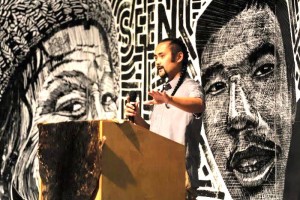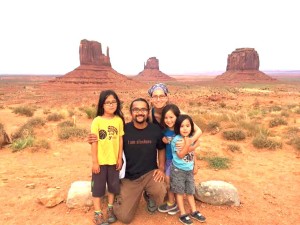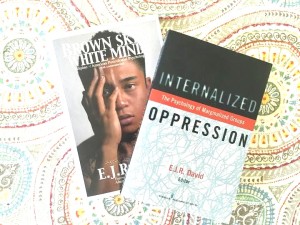A Filipino American prof recovers his ‘kapwa’

E.J.R. David at the Racial Equity Summit hosted by First Alaskans Institute (FAI) at the Egan Center on February 1-2, 2016. CONTRIBUTED
SAN FRANCISCO – Professor E.J.R. David, who identifies himself as an American, a Tagalog and a Kapampangan, said he struggled with colonial mentality, felt inferior for being a Filipino and was embarrassed by it. He wanted to have flawless English because accent-free English meant “intelligence.”
In the process, he lost his sense of “kapwa” or empathetic identity with compatriots as well as other human beings, he says. This prompted him to better understand this feeling. He eventually was able to publish books about it and has written numerous articles for Psychology Today.
David’s father ended his pursuit of a better life in Alaska, after a fruitless search in California and New York. David, then 14, and the rest of the family moved to Alaska. For David, the Filipinos’ understanding of “better” has been influenced by the values and standards of the United States, tainted by the legacy of oppression and colonialism. However, he does not blame Filipinos because “family” and providing a “better” life for it are deeply embedded in the Filipino psyche.
David, now an associate professor of psychology in the University of Alaska in Anchorage, a scientist and an author, describes his growing up years in America as oppressive, with plenty of discrimination.

E.J.R. David is married to Margaret, a Koyukon Athabascan; his children are “Filibascans.” From left to right: Malakas, Kalayaan (girl partially hidden) and Kaluguran, the youngest boy. CONTRIBUTED
“I’ve been told that people like me come to this country to steal jobs away from Americans. I’ve been accused of being a gangster, a murderer, a criminal and have been interrogated unfairly. But that’s not surprising – it’s still bothersome, damaging and wrong, but not surprising.”
Even when he became a professor in 2007, outside of the Department of Psychology, he experienced discrimination on all levels – from students, staff, fellow faculty members and administrators. He says that it takes a toll on one’s mental, spiritual and physical health and well-being.
“I am fortunate to have a solid support system within the university and beyond – in the local community and nationally – that supplies me with the strength and the courage to forge on. There’s plenty of work to do,” David says.
Understanding colonial mentality
David was puzzled by his own unsettling mindset. He began to question why so many Filipinos also held thoughts and feelings of inferiority. To better understand this, he took a psychology course during his freshman year at the University of Alaska Anchorage. Eventually, he obtained a masters and Ph.D. in clinical-community psychology from the University of Illinois.
David authored Brown Skin, White Minds: Filipino American Postcolonial Psychology (Information Age Publishing). It focuses on colonial mentality, or internalized oppression, especially as experienced by Filipinos in the diaspora.
His research suggests that colonial mentality is common among Filipinos, both in the United States and in the Philippines. He also explains its link to various health issues such as low self-esteem and symptoms of depression.
Moreover, his research suggests that a large portion of Filipinos, up to 99 percent, have encountered “inferior” messages about Filipino culture and ethnicity in both the Philippines and the United States.
“Colonial mentality is learned. Filipinos are not born into this world hating themselves and their bodies and their culture. Because our learning experiences vary, the existence of colonial mentality will also vary. If you grew up surrounded by messages about the inferiority of the Filipino culture and ethnicity – like skin whitening soaps, being teased as FOBs (Fresh Off the Boat, a pejorative slang for immigrants, usually Asians), suppression of Filipino languages – then there will probably be some tinge of colonial mentality in you,” he observes.
His second book, Internalized Oppression: The Psychology of Marginalized Groups (Springer Publishing), highlights the universality of internalized oppression, but at the same time acknowledges its unique manifestations and implications for various groups such as African Americans, Latinos, Asian Americans, Pacific Islanders, American Indians, Alaska Natives, women, the Lesbian, Gay, Bisexual, and Transgender community and people with disabilities.
Ideal Filipino American
Filipino Americans to David are U.S. citizens who have Filipino heritage and anyone with Filipino heritage who live in the United States, regardless of citizenship. His ideal Filipino American is someone who accurately and critically understands and regards both cultures, “who does not automatically regard anything American as superior to anything Filipino, who does not automatically regard anything Filipino as inferior to anything American.” Someone who has grappled with and shaken off colonial mentality.
According to David, Filipinos in the diaspora must remember the core value of “kapwa” aside from “pakikisama” and “utang na loob” (debt of gratitude), which are surface indicators of being a Filipino.
“Let’s have ‘kapwa’ drive how we relate to each other – how we relate to other Filipinos but also other human beings. In ‘kapwa’ we are all connected. And so remembering this will hopefully make us more mindful and careful of our thoughts, feelings, attitudes and behaviors toward ourselves, our families, our communities and other peoples. In kapwa, we are also all the same – no walls, no levels, no separations, no better, no worse. This will hopefully help us see our connectivity and similarity with other people, and help us treat each other with kindness and humanity,” David concludes.
